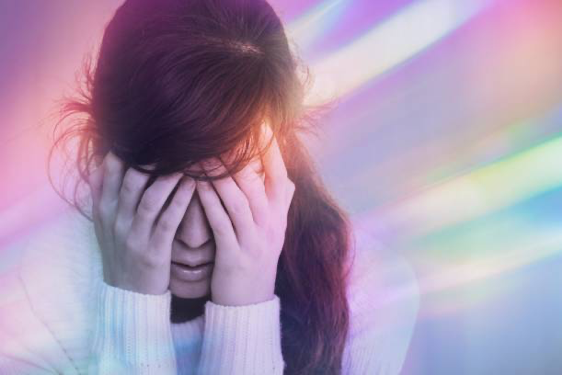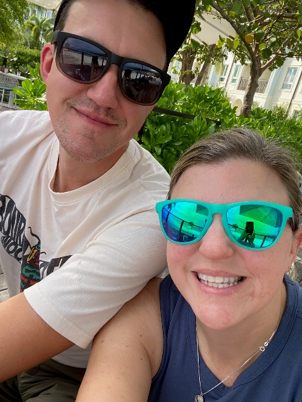

{Living life (just in some cute reflective shades) in Jamaica on our 15th-anniversary trip this year!}

According to WebMD, in the US, up to 17% of women get migraine attacks and 6% of men leading up to age 40. I started getting migraines when I turned 30 and would get them only a few times a year for a few hours, which I considered manageable. In 2022, my job became overwhelmingly stressful, to the point where I could feel myself holding my breath. I realized I needed to find a new job, as the stress was unsustainable. By February 2023, I was sitting at my desk when I suddenly couldn’t see out of my left eye. I tried pressing on it, hoping my vision would clear, but there was just a dark, blank spot. I texted my husband to start timing it and informed my coworkers, who were clearly alarmed. After about 30 minutes, my vision returned, and I felt fine, so I didn’t think much of it.
A month later, in March, it happened again, and this time, I was very concerned. I tried to document as much as possible with everything that had led up to it, everything that happened during, and what happened after. I was rattled. My husband convinced me to see my doctor, so I did. What happened in the next few weeks was a barrage of tests that made me cry almost daily, convinced that I was dying of a brain tumor and leaving my kids motherless and my husband a widower. I think my darkest thoughts were during my brain MRI. Only one of the earpieces in the headphones was working, so I had to hear the load clunking of the magnets thump through the machine as Taylor Swift’s song “Never Grow Up” played through the working earpiece. If you’ve never had any imaging done before, you’re supposed to remain completely still, but there’s no way they got a single good shot during that song because I was sobbing so hard.
Eventually, I got the diagnosis from the neurologist that I had migraines with and without aura; no one had told me until I had talked to the neurologist that the temporary blindness I had was called aura. Migraines aren’t going to kill me or you, but they are highly debilitating to anyone who has them. There are times that you can feel like you will never be without pain, which can lead to feelings of hopelessness and potentially suicide. So, with that said, as tough as all of the doctor’s appointments and diagnostics to ensure that it is “only” migraines can be, it is worth it all. It is also worth it to receive treatment. I am now on a daily preventative treatment keep my migraines from being as frequent as they once were (I was having 1-2 episodes a week lasting 2 days for each episode). Now, I only get 1-2 migraines a month, which are WAY more manageable. I also have a treatment that I take as soon as I feel a migraine coming on. These are good but not magic drugs that work immediately, which is why preventatives are so important.
My biggest suggestion for living with migraines is to know what triggers you. If you look online, you will find people saying that anything can trigger a migraine, so you need to know your own body. I found it helpful to talk to people who also deal with the disease and found what was useful to them. There are many support groups on Facebook that you can find for just about anything you want, and I suggest joining any or all of them and trying them out. They can be beneficial, and most of them, you can post anonymously to vent or ask questions if you don’t want to post as yourself. I found it healing to hear from other people going through the same things and know that I wasn’t alone. Below are some common triggers, as well as ones that I have found are specific to me.
Common Triggers:
• Food
o Aged Cheese (like parmesan, etc.)
o Chocolate
o Processed or cured meats (think sausages, hams, salami, etc.)
o Fermented or pickled foods (Sauerkraut, kimchi, etc.)
o Food additives like nitrates
• Beverages
o Alcohol
o Caffeine
• Bright lights
• Strong odors
• Stress
• Sleep changes
• Hormonal changes-birth control pills or menstrual cycle
• Weather changes
• Physical Activity
My triggers:
• Drinking Red wine
• Sleeping on stiff or over-stuffed pillows – I have found that a neck stretcher/extension thing I got from Amazon helps with this. If I feel like my neck tension is developing a migraine, I lay on it, stretching my neck and back for 10 minutes, and it feels much better, and I’ll do it again the next day if I need to; after a few nights, I feel normal again.
• Sunlight, specifically in my eyes, so I ALWAYS wear sunglasses on sunny days, even in the winter
• Strong odors-usually candles or perfumes
• STRESS is HUGE. I try what I can to not over-commit myself, to ask co-workers, family, friends, etc., when I need help, and I try to practice self-care
• Bending at the waist so that my head is below my waist repeatedly will inevitably lead to a migraine, usually from yardwork or picking up my kids’ toys.
This one is sometimes unavoidable, but when I feel like I’ve done too much, I try to take a break. I take a migraine pill, drink some water, and get a snack
During an Attack
I used to get anxious if I felt a migraine attack coming on and I didn’t have migraine meds with me. I worked 45 minutes from Quincy (my home), and I knew that if I couldn’t take my meds as soon as an attack was hitting, there was no hope of stomping it out before it got out of control. My neurologist likens it to defusing a bomb; you want to take the meds while the fuse is just lit, not when the bomb’s already exploded because then it does no good (or less good). Now that I work in town, I don’t get that anxiety anymore. If I don’t have pills with me, I have them at home, and I can just run and get one when I need it. Sometimes, the pills work right away, and I can go about my life as if nothing has happened. Other times, I’m not so lucky. Most of the time, I can work through an attack; I am usually nauseous without throwing up and sensitive to light and sound, but I can work in my office with the light off if I need to. Some people cannot do this; I know people who are so nauseated during migraines they cannot do anything more than lie down with a cool washcloth on their neck and occasionally vomit. If this is you, go home, draw the shades, and try to wait it out.
Do what you can during an attack without overdoing it. Your brain is telling you it has had too much, so you need to give it a break. If you don’t give it the break it needs, it will only continue to get worse. You will not do your best thinking, working, exercising, etc., when your brain wants to explode. If I can hand off parenting duties for the evening, I do. I text my husband that I’ve got a migraine, and I’m coming home to take a shower, and I’m out for the night. I find a hot shower helps my muscles to relax and my brain to release a little bit of tension. If it’s in my neck, I use the neck extender/stretcher for 10 minutes and go to bed. I have also found that two Benadryl before bed can also help with sinus pressure and to help me sleep since sleeping with pain is often a problem.
If I cannot hand off parenting duties for the night, I do what I can. I might run through a drive-through on the way home to get the kid’s dinner or get the air fryer going as soon as I get home. As soon as I walk in the door, I let my kids know that Mom isn’t feeling the best because I have a migraine. My kids (13 and 6) know the drill and are very sweet and helpful on nights like this. We work through homework, and the 13-year-old helps her brother with bath and bedtime. If there are practices, concerts, or anything extra going on, I struggle through it, but I completely understand anyone who cannot; it is hard.
One thing that can be difficult with this struggle is to know when it is truly a migraine or if it is a headache. I still don’t think I’ve figured it out 100% of the time. I usually try to assume that most are headaches until they have that different kind of feeling: the nausea, the neck pain, the body ache, the stuff that just won’t be touched by simple Ibuprofen or Tylenol.
Living a Life
Before I got on my preventative, I became almost obsessed with “triggers.” Thinking I needed to stop drinking red wine, I realized I probably needed to stop drinking all alcohol. Then, I thought maybe I wouldn’t enjoy summertime anymore because the sun was constantly going to be in my eyes-what a depressing life! But I soon realized with the help from my neurologist that preventative treatment can help me live my life like I want to live it and not have to obsess over these triggers so much; I mean, really, not going outside on a sunny day for fear of a migraine?! He explained that the preventative’s job is to knock down the frequency to a more manageable number and even to make the ones I have more manageable for emergency migraine treatment to treat. So, I did. It took me a few months to find the correct dose for the preventative to cover the frequency that I was having, but now, a year and a half after the blindness episodes started, I have them under control. If I could go back and tell myself anything, I would say, “Girl, breathe! This is scary, but you will make it out better and stronger on the other side.” And to anyone who struggles with migraines, know that you aren’t alone and there are so many resources out there and treatments to try; please contact your doctor and ask for a work-up, and if you don’t feel heard, find a new doctor! Many people who suffer from chronic pain and/or migraines suffer silently because they don’t feel like there is hope to feel better, and it just is not worth feeling less than your best for any longer than you have to. Take care of yourself.
-Nikki
